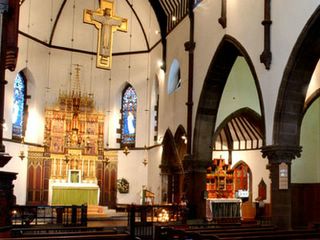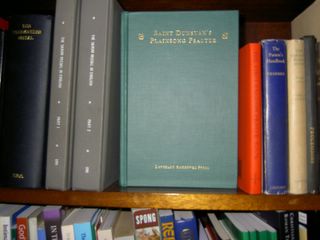On the canons
-
Longtime readers will know I enjoy Fr. Sergei Sveshnikov's books and
articles. Enjoy this discussion on the canons from ROCORStudies.
--------------------...
As of December, 2009, this blog is inactive at this location. All posts have been transferred to the new location here. You are very welcome to read and comment.
Saturday, June 25, 2005
ROCOR & the MP
Here are the latest joint documents. I'm glad to see that progress is being made, and I pray for more.
S. Michael & All Saints, Edinburgh

Who is like the Lord?
Here is a Mystery Worshipper report that I submitted a few weeks back. It is the second that I have done, the first being about three years ago, back when I was a wishy-washy liberal. ;-)
Ian commented favourably on it in a comment in my birthday post (immediately preceding this one), and asked for clarification of British Catholicism.
I won't give a detailed history here, partly because that isn't the aim of my blog and also I am not qualified, but this is the basic story.
Before the unpleasantness of the 16th century, the western rite had many local variants - all very clearly having the same origins, but with local elements that developed for various reasons. The local Uses, as they came to be known, were often diocesan, originating at the cathedral, and followed to a lesser degree in churches and chapels in each diocese. Some examples of British Uses are those of Exeter, York, Bangor, Hereford, and most well-known, Sarum (Salisbury). Westminster Abbey also had its own use, and the Westminster Missal was recently reprinted by the Henry Bradshaw Society. The Sarum Rite, in one form or another, eventually spread to most of Wales, the English south, Scotland and Ireland, and it is this that formed the basis for the Prayer Book of 1549.
Along with differences in the texts of the Mass were differences in the manner of observing certain days, and the ceremonial as well. For example, on Palm Sunday, whereas a palmesel (wooden figure of Christ on a donkey, on castors) was carted around in northern Europe, in the Sarum rite, the Blessed Sacrament was carried in procession instead. This, to me, makes infinitely more sense.
Genuflexion, for example, never formed a part of the Catholicism of the British Isles. Somebody from the pre-reformation period walking into an Anglo-Catholic parish today would perhaps wonder what on earth these people, bobbing up and down on one knee, were doing. A profound bow (from the waist) was the form of reverence given to the Most Blessed Sacrament.
Also, the surplice was full because of the colder British climate, so that the furs could be worn beneath it. Only on the continent did this take the form of a much closer-fitting garment, now known as the cotta. Both are regional variants of the same garment.
Two lights were used on the altar and no more. Although there would have been four - one on each riddel post, and two standards on the pavement, there were only ever two on the altar itself, and not on a shelf (or gradine) behind it.
The processional order was Clerk (carrying cross), then taperers carrying their lights, then thurifer, and then the Sacred ministers, for it was the priest who was seen as the icon of Christ by virtue of his ordination, and so the way was lit and censed for him. On the continent, it was the Cross that was seen as the icon of Christ, and so the thurifer walked before the Cross to cense the way for it, and the lights were carried on either side of the Cross.
The Blessed Sacrament was reserved in a hanging pyx, suspended above the high altar, and not in a bird ca..., er... tabernacle on the altar.
When Queen Mary Tudor restored Catholicism to England, it would have been the Sarum rite that was used. In the late 16th century, the Roman Catholic Church did away with most of these regional variations in the Council of Trent as a reaction against the protestant reformation, and standardised everything in the form of the Tridentine Mass - a rite which did not develop naturally, but was imposed by council. The Church of England had already become established in the Prayer Book by this point, and as this had the rite of Sarum as its basis, it would make sense that Sarum ceremonial be used with it. This is the tradition that Blessed Percy Dearmer followed in defiance of the culture of many Anglo-Catholics and high churchmen of his day of rejecting anything not Roman as protestant.
There was, at the time, the idea that in order to be Catholic, it was necessary to follow the continental traditions, and so things like two lights on the altar, bowing to the Sacrament and not genuflecting, the use of the surplice, and other things that had been part of the Catholic tradition of Britain for centuries, were condemned as protestant by those who favoured more continental practices. This, of course, is total nonsense, but the fruits of such ideas are seen in many Anglo-Catholic churches today, where one could easily be forgiven for thinking that one were in Italy or Spain.
At my own church, we tend to be more Sarum then Roman, although we're the higher side of middle. S. Mary-the-Virgin, Primrose Hill is rather Sarum, which, I suppose, is Dr Dearmer's legacy. Holy Innocents' Fallowfield, in Manchester is also higher side of middle, and is more Sarum, although very low-key. There are a few parishes like that, and small traditions have lived on and jump out where you may least expect them.
The Sarum rite is also the rite used by the western rite Orthodox in ROCOR, and there is a link to the version of it that they use on the St Petroc Monastery website.
I apologise for the not-particularly-objective wording, but I really do feel strongly about this for, as I said in the report, this rejection of our own heritage is unhealthy, and seems to imply that the religion of our ancestors was inferior. I cannot accept this.
Sunday, June 19, 2005
It's my party and I'll cry if I want to
Well, no need to cry, and no party either, but I turn 22 today, and just felt like saying so.
Now, where's the gin?
(walks off, muttering to self).
Now, where's the gin?
(walks off, muttering to self).
Saturday, June 18, 2005
Saint Dunstan's Plainsong Psalter

O sing unto the Lord a new song; let the congregation of saints praise him. Let Israel rejoice in him that made him, and let the children of Sion be joyful in their King. - Psalm 149: 1&2
This arrived in the post on Wednesday - a birthday present from a very good friend to whom I had mentioned a desire to have this in passing some weeks earlier.
It is an absolutely wonderful asset, which now enables me to sing the Office properly, and offers some translations to the Marian antiphons which are really easy on the ear. I enjoy metrical paraphrases to some degree, but a translation that fits the plainsong is far preferable.
I also love the fact that the Chapters and Nunc Dimittis antiphon from Compline have been provided. I feel somehow more complete now that I have this, and I am very grateful for it. It even has psalm 151!
I may even persuade my parish priest to use plainsong for Evensong one evening, as I have the organ accompaniment to the Sarum tones (courtesy of The St. Mary's Press, Wantage).
There are one or two things that stand out as a little odd, though. Firstly, in the introduction, we are told that 'These days, the pious will search far and wide' for The Plainsong Psalter and The Sarum Psalter of G H Palmer as though they are rare books. While it is true that the former has been out of print since 1960, the latter is, in fact, still in print. I bought a new copy from the sisters at Wantage last summer.
I can understand some of the collects and versicles and responses having been altered to refer to the state and the president instead of the Queen, as it is an American publication, but was the following really necessary?
From Evensong:
V/ Give peace in our time, O Lord.
R/ Because there is none other that fighteth for us, but only thou, O God.
has been changed to:
V/ Give peace in our time, O Lord.
R/ For it is thou Lord only that makest us dwell in safety.
I don't understand the reason for this change to one of the most emotive responses in this particular office.
That's the only thing that really bugs me, but as I prefer Vespers anyway, it won't be a problem. All in all, it's a fantastic publication, and I recommend it to anybody who is serious about singing the Office.
Felicity

The earth brought forth vegetation: plants yielding seed of every kind, and trees of every kind bearing fruit with the seed in it. And God saw that it was good. - Genesis 1:12
Meet Felicity.
I have never owned a plant before. I don't even know what type of plant she is, but she's very pretty. I purchased her on Thursday from a vendor who was visiting my place of work to sell his wares. I forgot to water her until Friday night when I noticed that she was looking a little weary, but she seems to be revived now. It may seem a little sad, but I'm really pleased, and she looks really at home on top of my bookcase.
Felicity - my first plant.
Saturday, June 11, 2005
Apocalypse
No, nothing quite as biblical as that, I'm afraid.
Has anybody seen the new film?
I've been told by one friend, an avid fan, that it is utter rubbish (not the word that he used) and by another good friend, also an avid fan, that it is fantastic.
I would rather like to see it, but would also prefer not to spend £4.50 for the privilege of wasting 2 hours of my life that I will never get back.
Do let me know what your thoughts are, as I plan to see it on Wednesday. Many thanks.
Has anybody seen the new film?
I've been told by one friend, an avid fan, that it is utter rubbish (not the word that he used) and by another good friend, also an avid fan, that it is fantastic.
I would rather like to see it, but would also prefer not to spend £4.50 for the privilege of wasting 2 hours of my life that I will never get back.
Do let me know what your thoughts are, as I plan to see it on Wednesday. Many thanks.
Baptism and the like
Go therefore and make disciples of all nations, baptizing them in the name of the Father and of the Son and of the Holy Spirit. - Matthew 28: 19
I was standing in the kitchen earlier today, washing the dishes, and I got to thinking about Sacramental validity.
More seriously, I was thinking about my own Baptism.
I know that when (and I am now at the point where I think I can say when rather than if) the time comes, I shall have to be baptised, and I know that this will not be considered by the Church to be sub conditione.
I actually do not struggle too much with this, as I was "baptised" by a priest who, 21 years on, is still remembered in the parish for his innovative services and departure from authorised liturgy. I have no way of knowing that I was indeed baptised 'in the name of the Father, and of the Son and of the Holy Spirit'.
My own Baptism got me to thinking a little more about the issue of Orthodox acceptance/non-acceptance of heterodox baptisms. I do not know what the official line is, although I know that different jurisdictions deal with different situations differently, some extending economy in some situations, and others baptising anything that draws breath and resembles a human being. ROCOR falls within the latter category, and this is the jurisdiction with which I have become involved. The following is where my own study has led me. I do not put this forward as Christian Truth, but just as the result of my musings.
The Roman Catholic Church and Church of England accept the filioque. This means that the very nature of the persons of the Trinity and their relationship to each other in these groups, is actually different from the Orthodox understanding of the same. In the Orthodox understanding, the first Person of the Trinity is generative: in the RC/CE underatanding, He shares this generative nature with the second Person. It therefore follows that in the Orthodox understanding, the second Person of the Trinity is not generative in the same way that the Father is: the opposite is true in the RC/CE understanding. Finally, the Orthodox understand the third Person to be in procession from the first Person alone, through the second Person: the RC/CE position is that the third Person is in procession from both the first and second Persons.
It is, therefore, arguable that, Creator-Redeemer-Sanctifier quasi-baptisms aside, even if an Anglican priest baptises 'in the name of the Father, and of the Son and of the Holy Spirit', in my understanding, he is not referring to the same Father, Son and Holy Spirit that the Orthodox understand Christ to have commanded us to baptise in the name of. The identity of each of the Persons and his relationship to the others - the very identity of God - is distorted. Even if the priest baptises with the intention required by RCs, "to do as the Church does in Baptism, (whatever that may be)", his understanding of what is the Church is not the same as the Orthodox understanding of the same. If Orthdoxy holds that right Faith must be present in order for the Sacraments/Mysteries to be effectual, then does the deficient understanding of the nature of the Holy Trinity render RC and Anglican baptisms ineffectual where otherwise they would be?
Just some thoughts.
Back again
Hello.
Things have been a little difficult of late, which is why I haven't spent much time updating or posting anything here for a couple of weeks. I just haven't had anything to say.
In that time, I have received numerous e-mails and other messages, expressing kind words about my hymns and posts in general, and how I have been missed. This, combined with the knowledge that prayers have been offered for me, has been a tremendous help. And so here I am, and you're all stuck with me. Muah ha ha ha ha ha ha ha ha!
I shall post more later.
Things have been a little difficult of late, which is why I haven't spent much time updating or posting anything here for a couple of weeks. I just haven't had anything to say.
In that time, I have received numerous e-mails and other messages, expressing kind words about my hymns and posts in general, and how I have been missed. This, combined with the knowledge that prayers have been offered for me, has been a tremendous help. And so here I am, and you're all stuck with me. Muah ha ha ha ha ha ha ha ha!
I shall post more later.
Subscribe to:
Comments (Atom)





